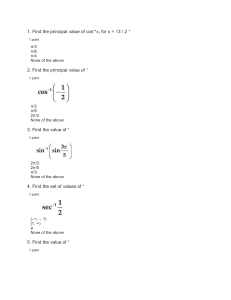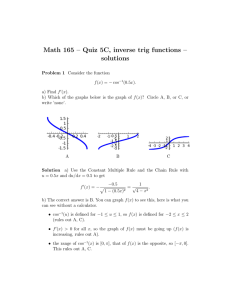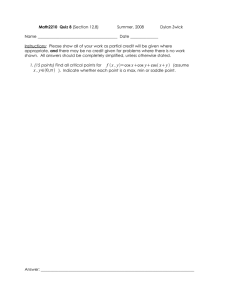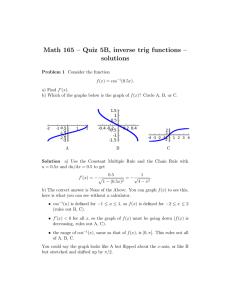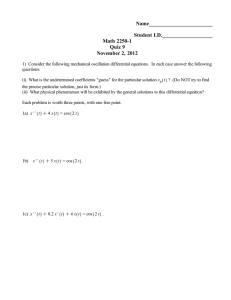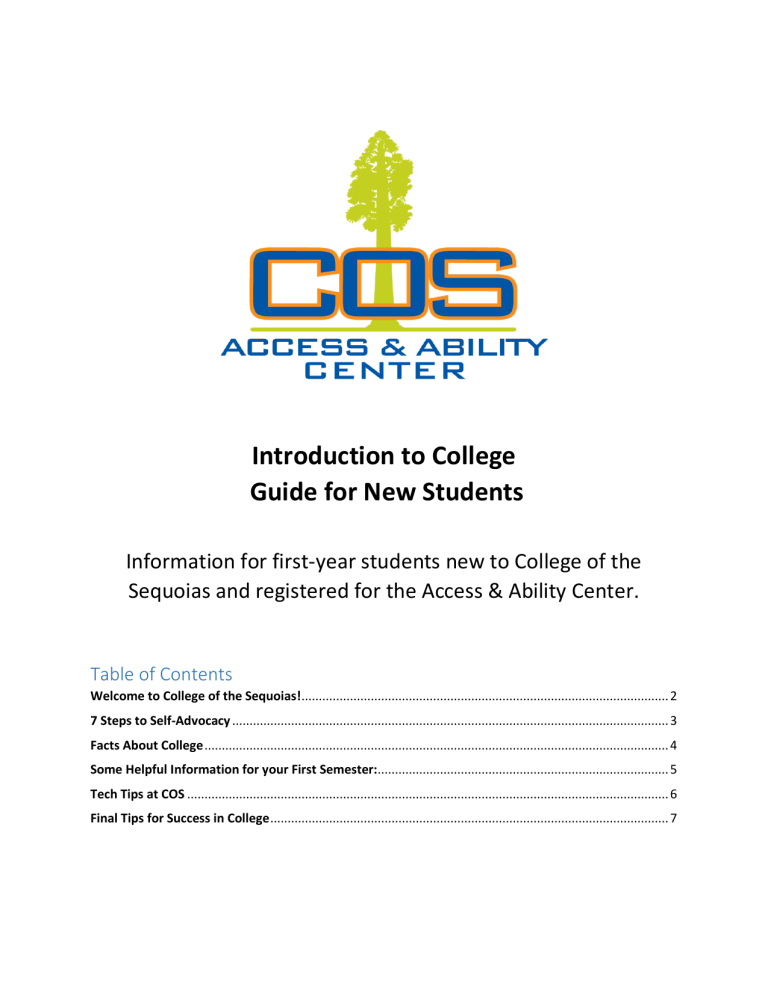
Introduction to College Guide for New Students Information for first-year students new to College of the Sequoias and registered for the Access & Ability Center. Table of Contents Welcome to College of the Sequoias!.......................................................................................................... 2 7 Steps to Self-Advocacy .............................................................................................................................. 3 Facts About College ...................................................................................................................................... 4 Some Helpful Information for your First Semester:.................................................................................... 5 Tech Tips at COS ........................................................................................................................................... 6 Final Tips for Success in College ................................................................................................................... 7 Welcome to College of the Sequoias! We’re glad you are here, and we’re excited to assist you in beginning your college journey. Enclosed in this handbook is some general information about college designed to help you learn to be a successful student. The first semester of college can be the hardest because you’re learning how to be a college student, in addition to taking your classes. We’re hoping this guidebook is helpful to you in your first semester here at College of the Sequoias. Welcome! A few beginning tips before we get started… • College education is not a guarantee or a right. Students must meet academic criteria and qualifications for initial and continued enrollment. • Accommodations or adjustments from high school may not transfer to college. • Students need to know what it means to be a college student (i.e., students need study skills and knowledge of how to plan study time – which you’ll read about later.) • Students need to monitor their own progress. They need to know when and how to ask for help. Continued attendance in college depends upon GPA (grade point average) and/or successful completion of courses. If students are not making progress, they will be placed on probation, and may eventually be disqualified if they do not improve their grades. • Students have the responsibility for planning, requesting accommodations, and for their own success in college. Grades are not given to students, they are earned by students. • Course modifications at the college level are not allowed. • The college/university does not offer personal services such as attendant care. These services are the student’s responsibility. • Transportation to and from the college is the student’s responsibility. • Students are responsible for college tuition and fees, purchase of textbooks, and payment of parking fees. Apply for financial aid and fee waivers if eligible. • Confidentiality: Colleges and agencies cannot disclose student information to parents or others without the student’s permission. You are the adult and you make your own decisions in college. • Students must disclose their disability if an accommodation is requested. Contact the Access and Ability Center office (AAC) to arrange an appointment with a counselor if needed. • Students are responsible for talking with college instructors about accommodations authorized by AAC. AAC can support this communication, if needed. • All students, regardless of disability or medical condition, need to follow the college’s code of conduct for behavior and maintain appropriate behavior in classes and on campus. • Expect social changes in college. College can be isolating for some students since they may not have daily contact with teachers or friends. Students need to know how to access college resources and services (i.e., counseling, special programs, student clubs, student activities. etc.). 2 7 Steps to Self-Advocacy Self-advocacy is the ability to identify and explain your needs. In High school, your advocates were your parents and teachers. In college, you must become your own advocate. A successful self-advocate recognizes the need for self-direction and independence. Step 1: Recognize that college success or failure is your responsibility. Step 2: Understand your disability and learn ways to compensate. Learn how to explain your disability and needs to others. Step 3: Develop good communication skills to request accommodations and services. Step 4: Know when you need help and ask for it. Understand that it is OK to use appropriate accommodations. Step 5: Know and understand your strengths and areas where you need to improve. Step 6: Develop and use mature social and personal skills. Step 7: Be organized. It relieves stress and demonstrates good planning ability. Here are some helpful suggestions to help you be a successful self-advocate: • Use a calendar or day planner to record appointments, class schedules, work schedules, exam dates, and assignment due dates. • Plan a reasonable school, study, social, and work schedule. Allow time for rest and recreation. • Establish a regular student schedule and study 2-3 hours for each hour you spend in class. • Organize long-term projects in a step-by-step manner. Schedule deadlines for each step in your day planner. Learn and practice time management skills. • Pay close attention to important information provided in the class syllabus typically given to you on the first day of class. • Attend class each day, on time, participate, and ask questions. It is VERY important to attend EVERY day of class so you do not miss out on information or material. Sit near the front of class, if you can. • Discuss and arrange AAC-approved classroom or test accommodations at the beginning of each semester with your instructor. If you don’t tell your instructor about your authorized accommodations, your instructor won’t know to help you with your accommodations. • Allow time for the unexpected such as illness, transportation glitches, or work schedule changes. Do not wait until “disaster strikes.” Meet with your instructors and/or AAC counselor when you are first having difficulty in college. 3 Facts About College 1. College is just one alternative; for some it is the right choice. 2. College courses vary in difficulty, some require lots of reading such as history or psychology, some require lots of writing such as English and some require lots of practice such as keyboarding or basketball. 3. People who graduate from college usually make more money in their lifetime. 4. Students can be “kicked out” of college. 5. A college education costs money. 6. Students in college classes may range in age from 16 to 80 years of age. 7. Some college classes meet one day a week, some meet two days a week and some meet every day. Some classes meet at night. Some do not meet at all (for example, Online classes). 8. Some classes are more demanding than others. 9. Sometimes classes in college may have more than 100 students. 10. At a community college (like COS), students who are struggling with class work may get more academic support than what a four-year university can offer. 11. Even though a community college is supposed to be a two-year college, students often take more than two years to complete all requirements. 12. When students satisfactorily complete a college course they are done with that course; they do not have to repeat it. 13. College counselors advise students on what classes to take; it is the student’s responsibility to add or drop classes. 14. In college, students are expected to self-advocate by seeking out help and asking questions. 15. College students need to be independent and take responsibility for attending class, taking notes, doing homework, meeting deadlines, etc. There isn’t anybody to remind students of these things. You are responsible for your own success. 4 Some Helpful Information for your First Semester: Buy Textbooks Early! Be prepared for your classes by reading ahead! Books are expensive. Plan ahead for this expense before the term begins. You do not always need to buy brand new books. RENTING books or buying USED books is a good way to save some money. Books are available in the bookstore, or you can shop for used books online. Check your eligibility for the Extended Opportunity Programs and Services (EOPS) financial assistance, which can cover some textbook costs. If you are signed up with DOR (the Department of Rehabilitation), be sure to discuss book costs and purchasing procedures with your Rehabilitation Counselor. DOR may also be able to assist with tuition costs. Make sure you keep up on your assignments and reading! For every hour you are in class, you need to study 2 more hours outside of class. For example, if you’re taking 12 units, you spend 12 hours in class each week. Add two additional hours of outside-class studying for every in-class hour, so now you’re at 12 hours in class and 24 hours outside of class. That’s a total of 36 hours per week of studying – the same as a Full-Time job! When you get your Class Syllabus, find your assignment due dates for that class and write them down in a calendar you check regularly. Do not wait until it’s too late to do your homework, but allow yourself plenty of time to complete your work. Read before class, so you are prepared to discuss whatever the topic will be for that day. If you decide to stop attending a class and do not want to be in that class anymore, it is YOUR responsibility to DROP the class. If you stop attending and do not drop the class, your instructor may not drop you and may give you an “F” for not doing the work. To drop a class, log onto your Banner Web and go to “Student Services.” For help adding or dropping classes, you can go to the COS Welcome Center for hands-on assistance. You must drop a class by the drop deadline. If you drop a class after the COS drop date, you will get a W on your transcript (you don’t want too many of these). Before you drop a class, we recommend seeing one of our counselors so you can learn about how dropping the class may impact you. Parking permits are required to park in campus parking lots. Parking passes are available for purchase online at www.buymypermit.com/cos. Parking passes are also available for purchase in person at any of our campuses. Once you have your Parking Pass displayed on your car, you can park in any of the designated student parking spaces (the white spaces). Tip – If possible, find a place you can study and do homework on campus. At the campus coffee shop, on a table outside, in the grass somewhere, or in one of our many computer labs on campus. 5 Tech Tips at COS The official means of communication at COS is email. Now that you are a COS student, you have your own COS email address. You can view your COS email inbox by viewing Microsoft 365 and clicking on Microsoft Outlook. It’s a good idea to be checking your COS email every day. You will get emails about different important information regarding COS and class updates or messages from your instructors. When you send an email, put a 2-5 word phrase in the subject line about what the email is about, and type the actual message in the body of the email. You have access to Microsoft Office 365, which includes Word, Excel, PowerPoint, and more – If you need to write essays or create PowerPoint presentations, you can do it all online for free. Part of the Microsoft Office Suite is Microsoft OneDrive. This is a Cloud-storage drive, where you can save any of your files to this drive and be able to access those files from any computer with an internet connection and your MyGiant login information. To be able to utilize all these great features, go to www.cos.edu and click on the orange MyGiant button in the top right corner. You’ll have to sign in to your Universal Login to be able to access your COS Student Portal. Once logged into your Student Portal, you can chose to login to Microsoft Office 365/email, you can view your BannerWeb, and you can view Canvas. Canvas is an online class environment, the official Learning Management System of COS. You may likely have some classes on Canvas for online classes, or face-to-face classes where the teacher also uses Canvas for grading and other additional class information. BannerWeb is an online portal for you to view your class schedule, financial aid status, and add/drop classes to your schedule (also called registration). 6 Final Tips for Success in College In the College Classroom… Attend every class. Always be on time for class. Come to class prepared (with notebooks, writing utensils, readings completed, etc) Be alert and attentive in class. Participate in class discussions and show an interest in the subject. Ask questions when you don’t fully understand. Go the extra mile with all papers and assignments. Take notes. Comment on lecture material. Set goals and objectives for your classes. Evaluate yourself. With your Instructors… Get to know your professors. When you must miss a class, notify them ahead of time, if possible. Set up meetings with your professors to discuss your progress. Ask questions when you don’t fully understand. With Classmates… When you must miss a class, make sure you find out exactly what you missed, make up the work, and come prepared for the next class. If using note-taking paper in class, ask a classmate to take notes for you and provide them with paper. (“If I give you free paper, will you take notes for me?” is an example of how to ask.) Set up study groups. Be supportive of your classmates. Make friends. It’s helpful having a support system with similar goals. Join campus groups and organizations (See Student Activities/Affairs office next to the bookstore). In an Online/Hybrid class… Communicate with your professors after registering and check COS email frequently. Obtain required class materials and become familiar with how to submit assignments. Utilize your strong time-management skills and schedule time to login and complete work. Prepare for lots of reading and writing on the discussion board. 7
